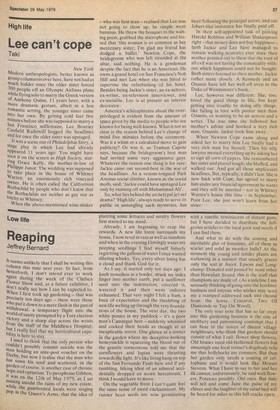Lee can't cope
Taki
New York Modern anthropologists, better known as gossip columnists over here, have not had as much fodder since the older sister forced 300 people off an Olympic Airlines plane While flying solo to marry the Greek version of Anthony Quinn, 11 years later, with a more dramatic gesture, albeit in a less romantic setting, the younger sister came into her own. By getting cold feet five minutes before she was supposed to marry a San Francisco millionaire, Lee Bouvier Canfield Radiiwill hogged the headlines and for once the older sister was upstaged. It was a scene out of Philadelphia Story, a stage play in which Lee had already appeared 11 years ago. You might have seen it on the screen as High Society, starring Grace Kelly, the mother-in-law of Philippe Junot. The wedding was supposed to take place in the house of Whitney Warren, an enormously rich vineyard owner. He is often called the Californian Rothschild by people who don't know that the Rothschilds are neither as gay nor as bitchy as Whitney. When the above-mentioned wine-maker — who was best man — realised that Lee was not going to show up, he simple went bananas. He threw the bouquet to the waiting press, grabbed the microphone and hissed that 'this woman is as common as her mercenary sister; I'm glad my friend has dodged a bullet.' Newton Cope, the bridegroom who was left stranded at the altar, said nothing. He is a gentleman despite the fact that he is an American. He owns a grand hotel on San Francisco's Nob Hill and met Lee when she was hired to supervise the refurbishing of his hotel. Besides being Jackie's sister, an ex-actress, ex-writer, ex-television interviewer, and ex-socialite, Lee is at present an interior decorator.
America's schizophrenia about the overprivileged is evident from the amount of space given by the media to people who are known for being well-known. What is not so clear is the reason behind Lee's change of mind five minutes before the ceremony. Was it a whim or a calculated move to gain publicity? Or was it, as Truman Capote says, because the bridegroom's best man had invited some very aggressive gays. Whatever the reason one thing is for sure: Jackie came out second-best in the war of the headlines. As a venom-tongued Park Avenue social climber, known as the social moth, said: 'Jackie could have upstaged Lee only by running off with Muhammad Ali'.
So, what lies behind the archetypal jet-set drama? 'High life', always ready to serve its public in untangling such mysteries, has been following the principal actors, and our Jobert-like insistence has finally paid off.
In their self-appointed task of proving Harold Robbins and William Shakespeare right — that money does not buy happiness — both Jackie and Lee have managed to remain walking neurotics ever since their mother pointed out to them that the root of all evil was not having the commodity without, which happiness could not be bought. Both sisters listened to their mother, Jackie rather more closely. A Kennedy and an Onassis have left her well off even in the Duke of Westminster's book.
Lee, however was different. She, too, loved the good things in life, but kept getting into trouble by doing silly things, like falling in love with poorer men than Onassis, or wanting to be an actress and a writer. The one time she followed her mother's advice and hooked a very rich man, Onassis, Jackie took him away.
When Newton Cope came along and asked her to marry him Lee finally had a very rich man for herself. Then his silly lawyers messed everything up by asking her to sign all sorts of papers. She remembered her sister and played tough; she bluffed, and walked out. And got all those unpleasant headlines. But, typically, it didn't last. She is now back with Cope, has agreed to many him under any financial agreement he wants and they will be married — not in Whitney Warren's house this time — in September. Poor Lee, she just won't learn from her sister.


































 Previous page
Previous page